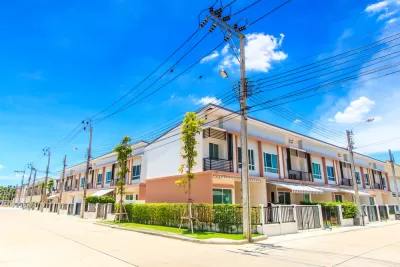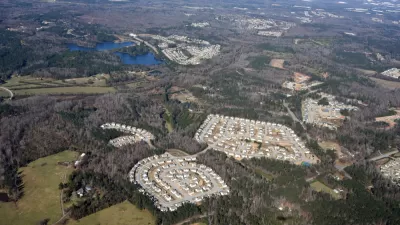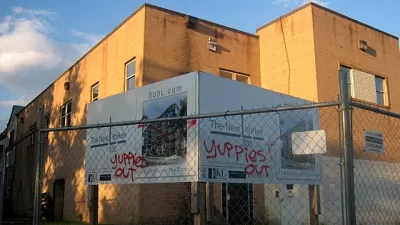Is the challenge of retrofitting sprawl intractable or unavoidable?

Robert Steuteville picks up on a debate from the CNU conference earlier this year about whether "whether sprawl repair is worth the trouble." Steuteville notes first that the debate was surprising, given that "Retrofitting Suburbia was one of top books in the planning field in the last decade" and co-author Ellen Dunham-Jones "has accumulated a database of more than 1,200 suburban retrofit projects under construction or in planning."
Architect Kevin Klinkenberg and development expert Lee Sobel, however, dared to argue that sprawl repair is "a fool's errand." Klinkenberg even penned a blog post in May making this provocative argument: "Suburbia, or sprawl as we interchangeably call it, is all about bigness and mass production," meaning, "it's outside the DNA of walkable cities. Embracing sprawl retrofit is like saying we can transform fast food culture into healthy food."
Steuteville, however, rejects that premise, and proceeds to take on theanti-suburban retrofit arguments, one by one. Those arguments include:
- "Even when suburban retrofit projects are built, the urbanism is far from great." Steuteville's response is that "turning a lousy place into a decent one improves people's lives."
- "Existing urban places are plentiful, so just work in those areas." Actually, argues Steuteville, the supply of urban areas with 19th century and early 20th century street grids is extremely finite, meaning it will never meet demand. "Values will relentlessly increase unless we transform some of the drivable suburban areas."
A final point is that much of what Klinkenberg abhors about sprawl, especially its "bigness," can also be found in cities. So, says Steuteville: "We can't avoid the task of sprawl repair—not even in cities."
FULL STORY: Sprawl repair is essential, unavoidable

Planetizen Federal Action Tracker
A weekly monitor of how Trump’s orders and actions are impacting planners and planning in America.

Congressman Proposes Bill to Rename DC Metro “Trump Train”
The Make Autorail Great Again Act would withhold federal funding to the system until the Washington Metropolitan Area Transit Authority (WMATA), rebrands as the Washington Metropolitan Authority for Greater Access (WMAGA).

The Simple Legislative Tool Transforming Vacant Downtowns
In California, Michigan and Georgia, an easy win is bringing dollars — and delight — back to city centers.

The States Losing Rural Delivery Rooms at an Alarming Pace
In some states, as few as 9% of rural hospitals still deliver babies. As a result, rising pre-term births, no adequate pre-term care and "harrowing" close calls are a growing reality.

The Small South Asian Republic Going all in on EVs
Thanks to one simple policy change less than five years ago, 65% of new cars in this Himalayan country are now electric.

DC Backpedals on Bike Lane Protection, Swaps Barriers for Paint
Citing aesthetic concerns, the city is removing the concrete barriers and flexposts that once separated Arizona Avenue cyclists from motor vehicles.
Urban Design for Planners 1: Software Tools
This six-course series explores essential urban design concepts using open source software and equips planners with the tools they need to participate fully in the urban design process.
Planning for Universal Design
Learn the tools for implementing Universal Design in planning regulations.
Smith Gee Studio
City of Charlotte
City of Camden Redevelopment Agency
City of Astoria
Transportation Research & Education Center (TREC) at Portland State University
US High Speed Rail Association
City of Camden Redevelopment Agency
Municipality of Princeton (NJ)





























